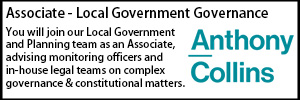Government intervention at Slough to continue despite commissioners reporting finance and governance improvements
- Details
Commissioners have said Slough Borough Council is at a "pivot point" after improvements at the local authority but that more demonstrable and sustained improvement is required before reducing the scale of intervention.
In their third report on Slough after the Government intervened in December 2021, commissioners Gavin Jones, Denise Murray and Ged Curran said it is still “too early to determine the council's ability to sustain itself so that it can continue to support its core services”.
The Government initiated an intervention after Slough issued a section 114 notice in the face of more than £700m debt.
The ensuing commissioners’ reports suggested that the council would need to reduce its size by 15-20% and would require continuous financial support until at least 2028.
These changes were dependent on a change in the culture at Slough that would encourage "openness, transparency, honesty, and effective delivery," the second report noted.
In the third report, delivered to Lee Rowley in July and published late last week (14 September), commissioners welcomed the transfer of the internal audit function back to the council.
"However, in further establishing and embedding the function, the council will need to demonstrate that it takes audit conclusions seriously, improvements continue in the timely manner that audit recommendations are acted upon and that policies, practices and the planned programme of internal audit work confirm that the service contributes to the continuous improvements of systems of governance, risk management and internal controls."
The third report noted that the quality of reports to members has improved "in many areas," but the council "will need to ensure that all officer reports are based on good evidence and proper choices for member consideration".
There is also now a "stable top team" at the corporate leadership level, with the three statutory officers being permanent employees.
In addition, it highlighted that member training has improved, "and this will need to be sustained given the large number of inexperienced councillors now serving on the council, and to ensure a successful change in political leadership".
According to the report, "good progress" is being made in addressing many of the financial issues outlined in the Government's directions.
The upcoming financial year will be a key period in the improvements, according to the report.
But it noted that: “The departmental restructure has been completed and permanent recruitment is underway. Financial governance and oversight, processes and practices are improving and monthly budget monitoring reporting for 2023/24 commencing from period two."
The audit of the 2018/19 statement of accounts is due to conclude imminently as well, and the 2022/23 draft annual governance statement has been prepared for consideration by the Audit and Corporate Governance committee.
Capital receipts from asset sales are on track, and the planning for the development of a balanced rolling three to five-year medium-term financial plan commencing 2024/25 is underway, the report added.
Despite these improvements, the commissioners said it was too early to determine the council's ability to sustain itself and deliver its services, especially in the face of "pressures from growing demand, tightening funding and an increasingly complex and unpredictable financial environment".
Commenting on the council's overall position, the commissioners said: "Whilst the council is now demonstrating commitment to improvement and is working hard to that aim, the scale of the problems that need to be addressed are such that more demonstrable and sustained improvement is required before Commissioners can consider any reduction in the scale of intervention.
"With good early planning, there has been some material progress on addressing the organisations cultural issues and the Chief Executive is taking personal ownership of the agenda for change."
Responding to the report in a letter to the commissioners, Local Government Minister Lee Rowley said: "Your latest report has been submitted after a period of change for the council. May's elections brought new political leadership, and over recent months, the corporate leadership has also gone through a significant change.
"It was good news, therefore, to receive July's report which gave a more positive update and indicated cautious and early optimism that things are beginning to move in the right direction. I am pleased to see that the council has made progress in some areas (including improvement in report quality and financial oversight, improved scrutiny arrangements and a successful move to all-out elections)."
He continued: "It remains early days but these examples, I hope, will be the start of a more positive trend back to health for the council".
Rowley noted that despite the improvements, he still agreed that "the scale of the challenges facing Slough remain significant" and said he wished to see a "clear quickening of pace of improvement, evidence of further implementation, clear change being embedded throughout the council's business model and greater grip on the financial position".
Commenting on the third report, Slough's chief executive, Stephen Brown, said: "We have come a long way. Our asset sales are progressing well, we have a balanced budget for this year and last year we even managed a small underspend.
"Despite this, our financial position remains challenging though we are all committed to Slough, our town and its residents and we will now continue to work towards financial recovery, furthering the significant progress which has already been made.
"As a council we are well aware of the journey ahead and are committed to the recovery of the council."
Adam Carey
Governance Officer/Company Secretary
Head of Legal Services / Deputy Monitoring Officer
Locums
Poll

















